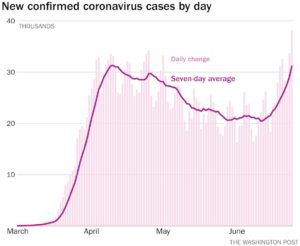Tuesday in Whitewater will be partly sunny with scattered afternoon thundershowers and a high of eighty-nine. Sunrise is 5:20 AM and sunset 8:37 PM, for 15h 16m 41s of daytime. The moon is waxing gibbous with 73.7% of its visible disk illuminated.
The Whitewater Common Council meets via audiovisual conferencing at 3 PM.
On this day in 1864, Pres. Lincoln grants Yosemite Valley to California for “public use, resort and recreation.”
Recommended for reading in full —
Elizabeth Spiers writes Trump’s ‘silent majority’ isn’t a majority, and it’s far from silent:
The Trump team’s declaration that a silent majority lurks, ready to return Trump to the White House, is at odds with almost everything else the president says and does. His efforts to make it harder to vote by opposing voting by mail in the middle of a pandemic, and his repeated claims that Democrats are plotting election fraud, suggest a distinct nervousness about the majority’s true will. He appears to be laying the groundwork for explaining away a Democratic victory in November, as the result of deception and trickery. On June 22 he tweeted, in typical fashion: “RIGGED 2020 ELECTION: MILLIONS OF MAIL-IN BALLOTS WILL BE PRINTED BY FOREIGN COUNTRIES, AND OTHERS. IT WILL BE THE SCANDAL OF OUR TIMES!” In a system where success usually depends on grasping what a majority of the electorate wants, the sound strategy might be to reach out from one’s base to voters in the middle. Trump instead is heavily invested in the assumption that his enthusiastic minority will determine the outcome — even if it means that the people who don’t like him are prevented from voting.
The rhetoric serves a purpose. Even a few hardcore Trump supporters must be wondering now about the 13.3 percent unemployment rate, for example. By assuring his core supporters that they represent a large, cohesive group of Americans who share similar grievances — and, more importantly, common enemies, notably Democrats and the media — he helps to keep his base in line. Silent-majority rhetoric makes the grievances seem more legitimate.
Trump’s gambit for the election, in the face of falling support, is to convince the extremists that they are the true voice of the nation, even though every bit of empirical evidence indicates otherwise. He’s gaslighting his base. That explains why he’s still brandishing county-level maps of the 2016 electoral college results drenched in red and relying on misinterpretation to make it look like a mandate. (Trump won a majority of America’s acres, not votes.) Trump’s core supporters don’t need overwhelming evidence that they’re a majority to believe it; they just need to see a few good omens to maintain the faith.
Carl Bernstein reports From pandering to Putin to abusing allies and ignoring his own advisers, Trump’s phone calls alarm US officials:
In hundreds of highly classified phone calls with foreign heads of state, President Donald Trump was so consistently unprepared for discussion of serious issues, so often outplayed in his conversations with powerful leaders like Russian President Vladimir Putin and Turkish President Recep Erdogan, and so abusive to leaders of America’s principal allies, that the calls helped convince some senior US officials — including his former secretaries of state and defense, two national security advisers and his longest-serving chief of staff — that the President himself posed a danger to the national security of the United States, according to White House and intelligence officials intimately familiar with the contents of the conversations.
Lazy Dog Finds Cozy Spot, Refuses to Move:
more >>

